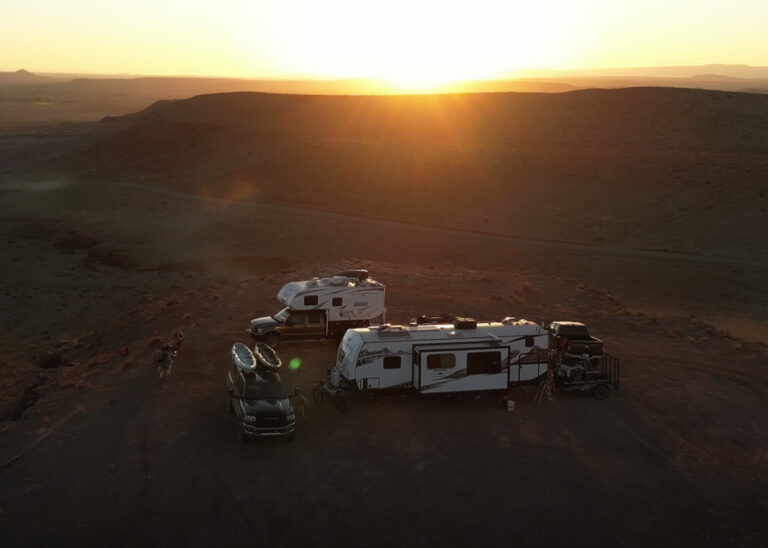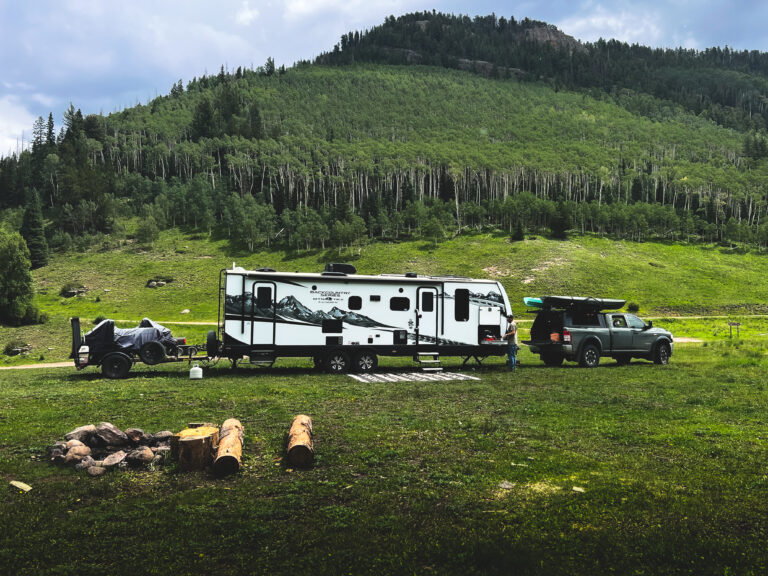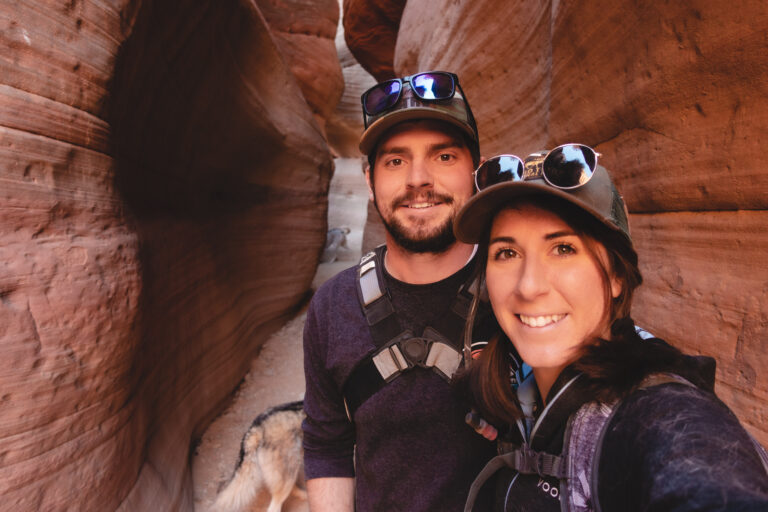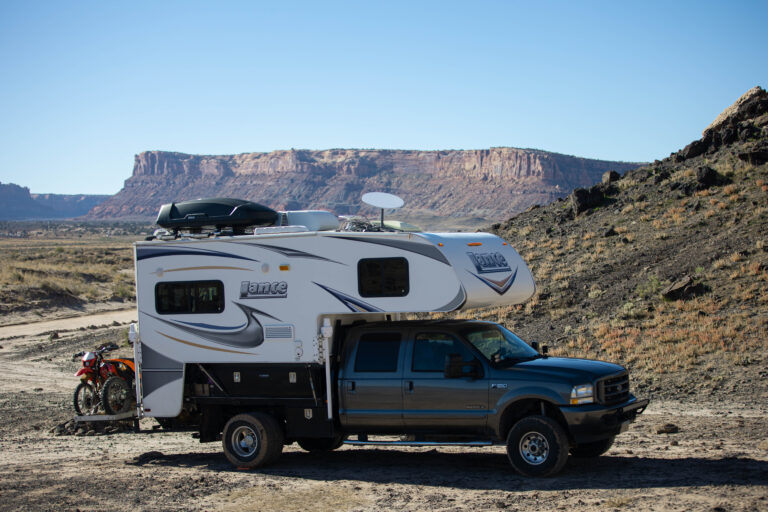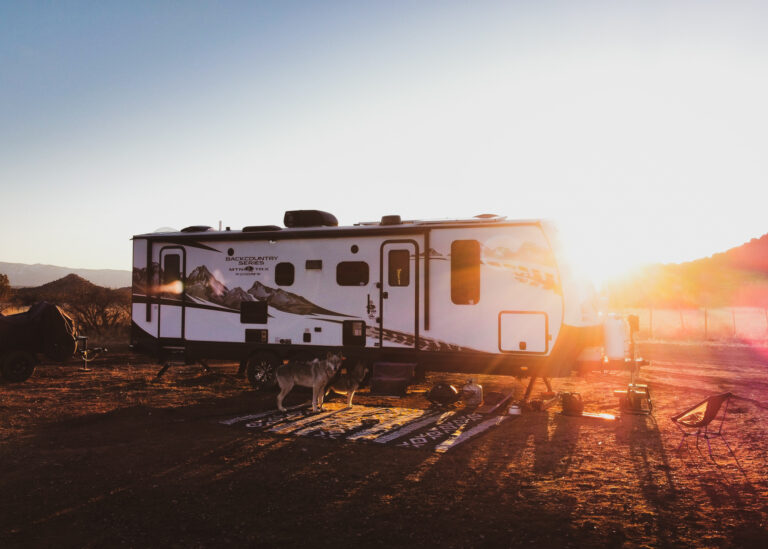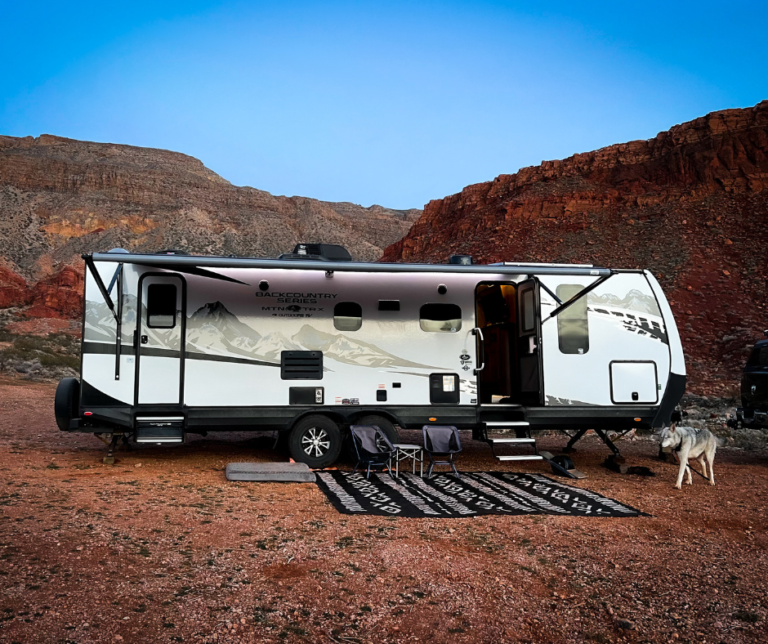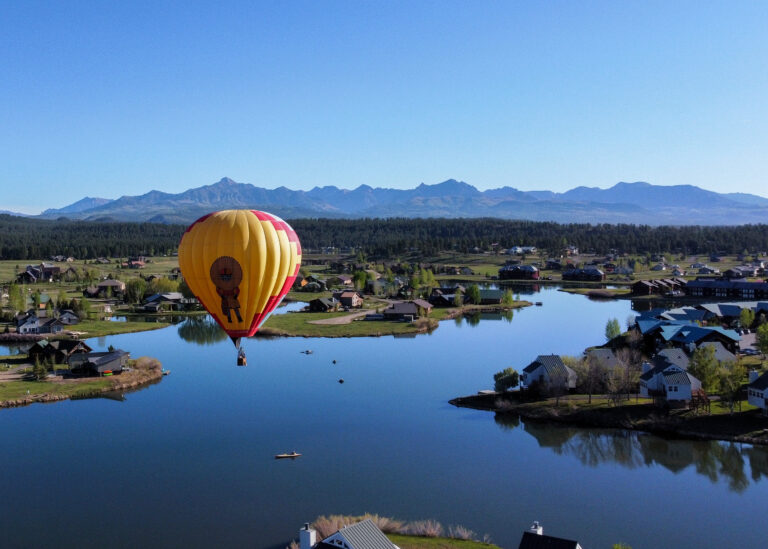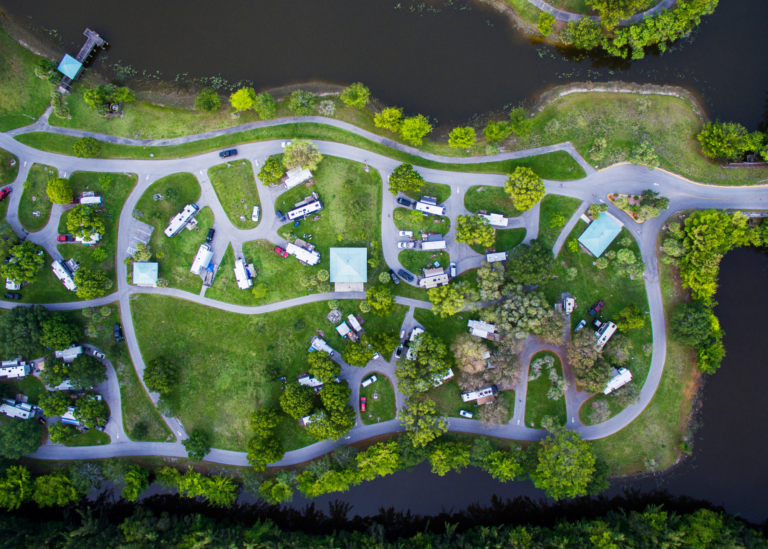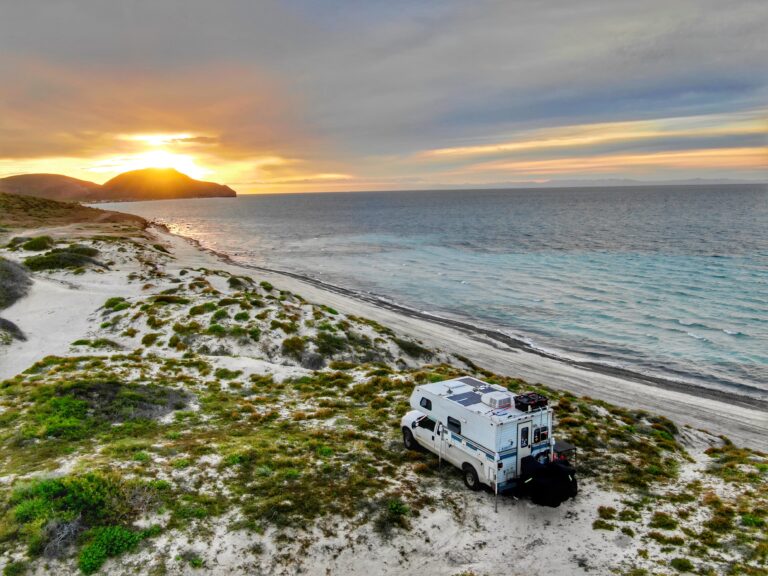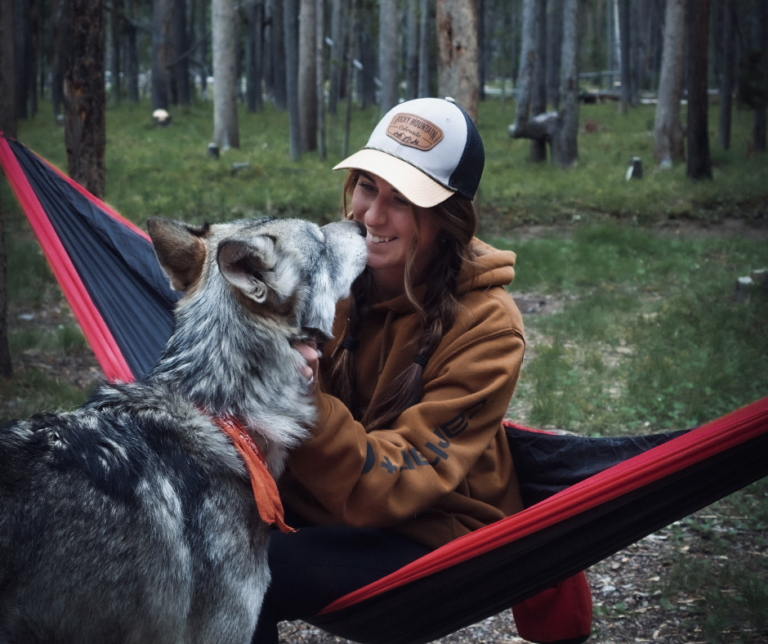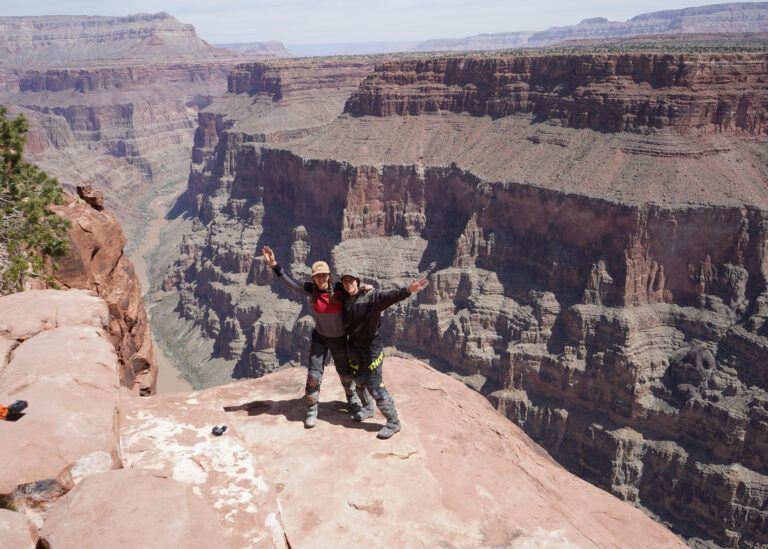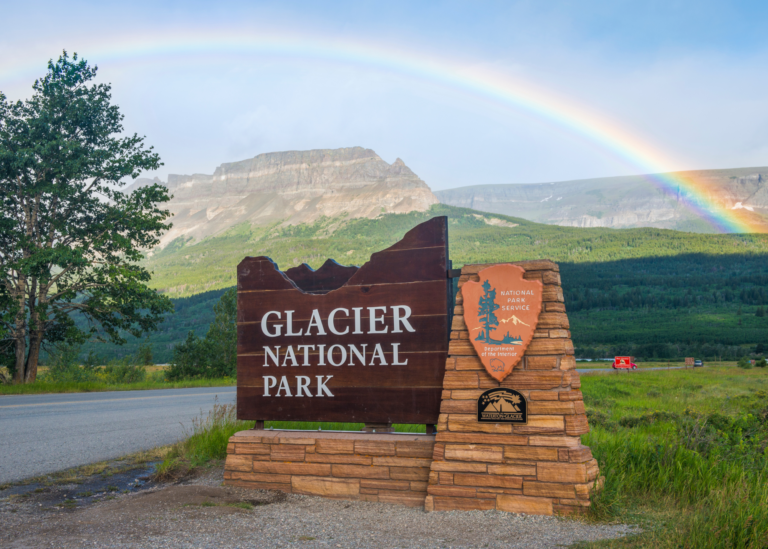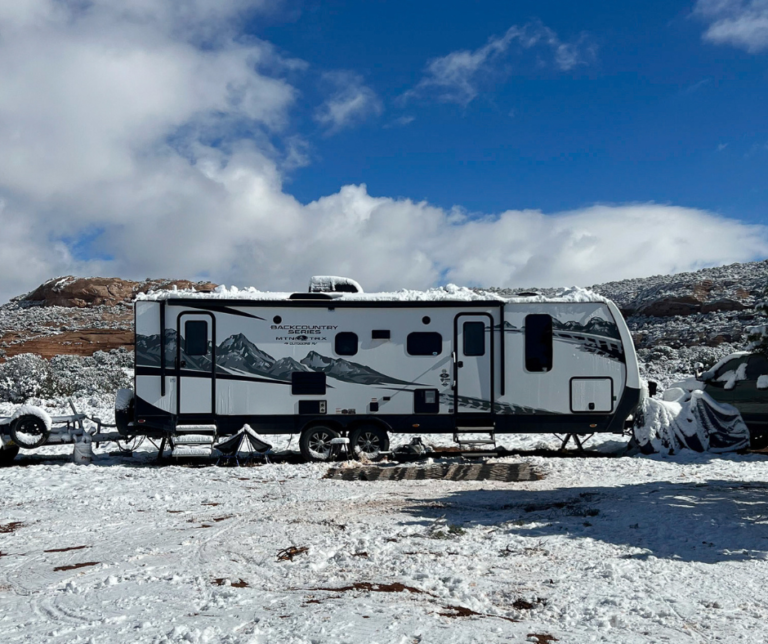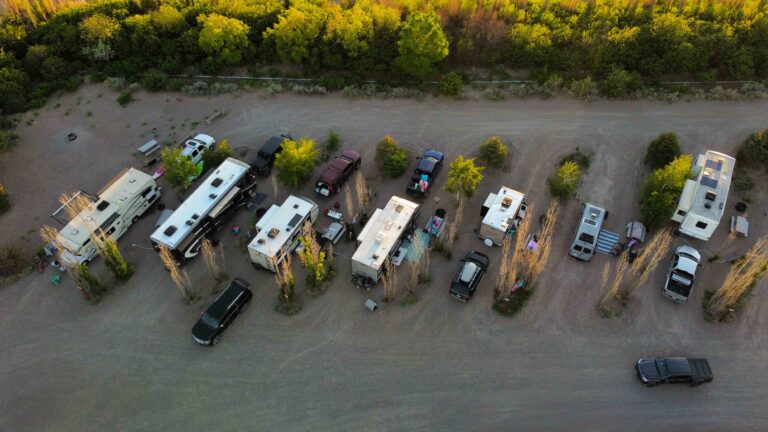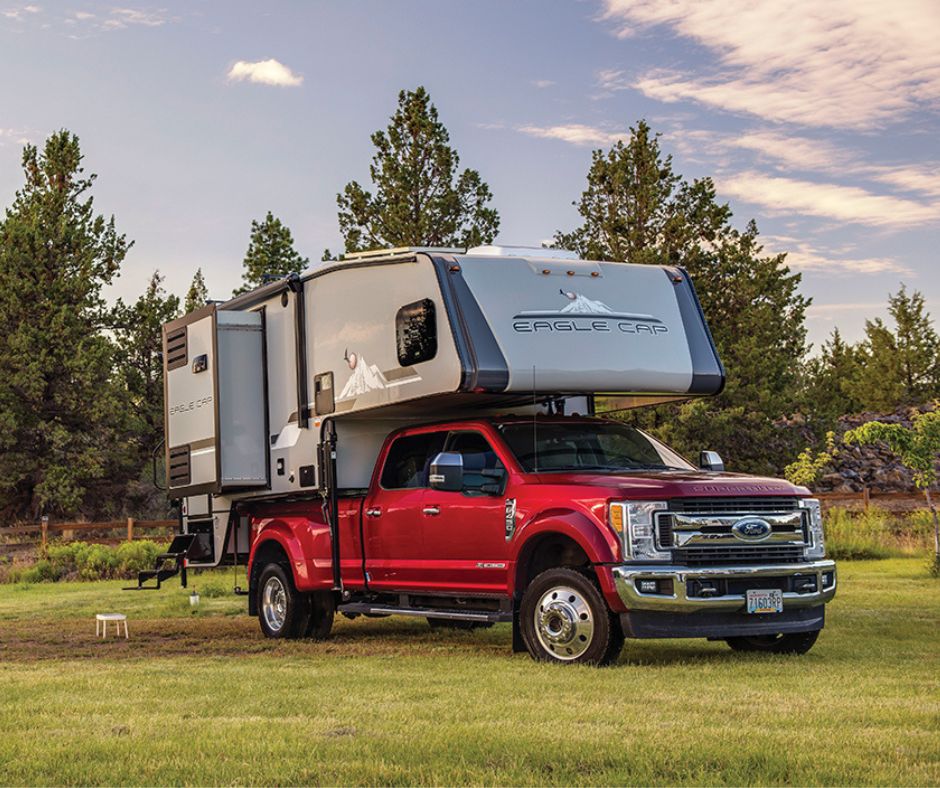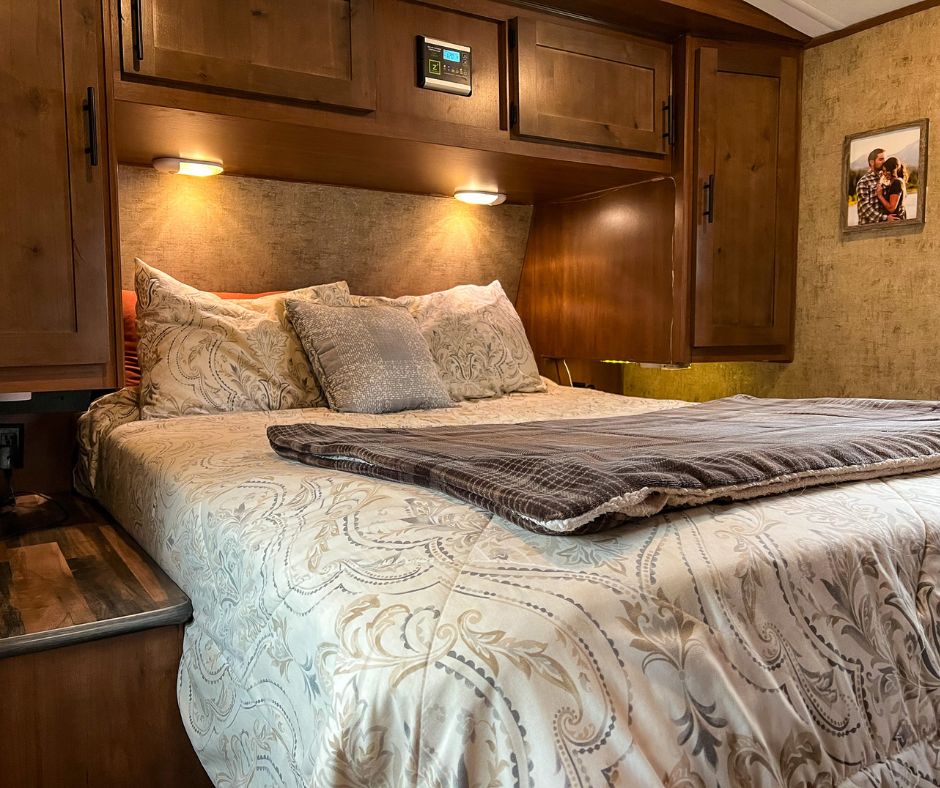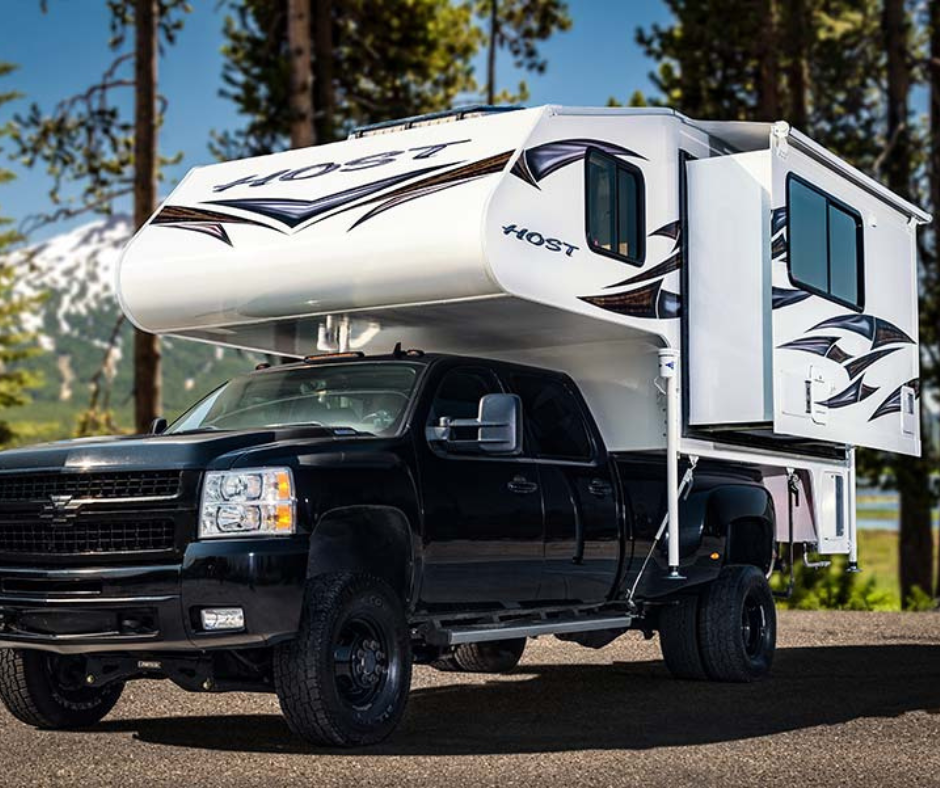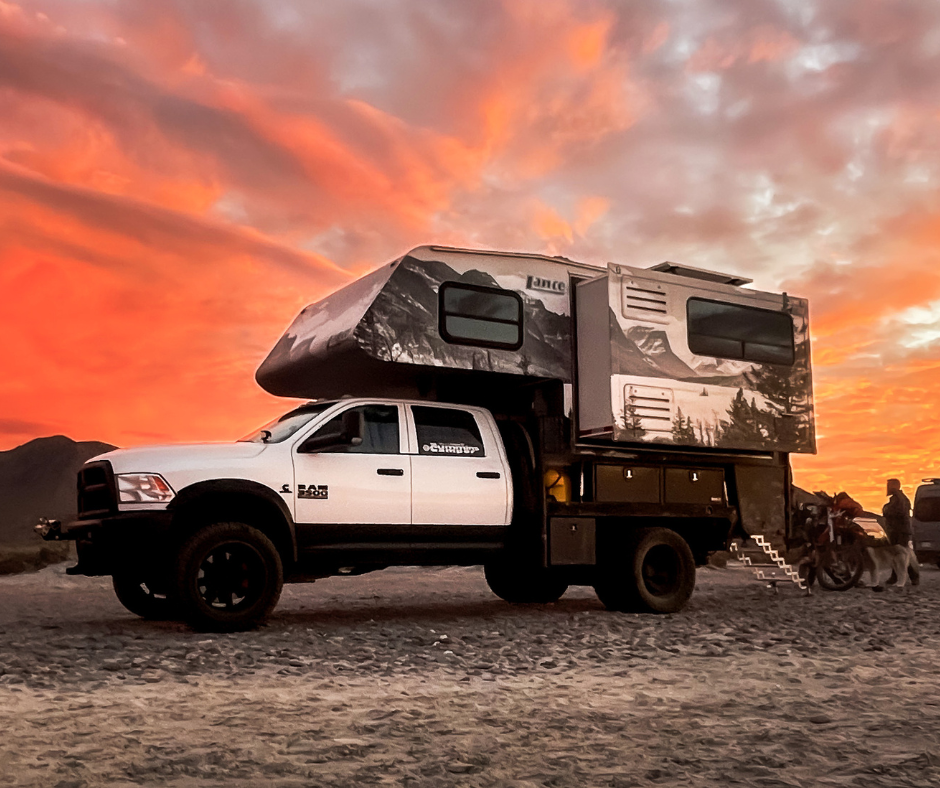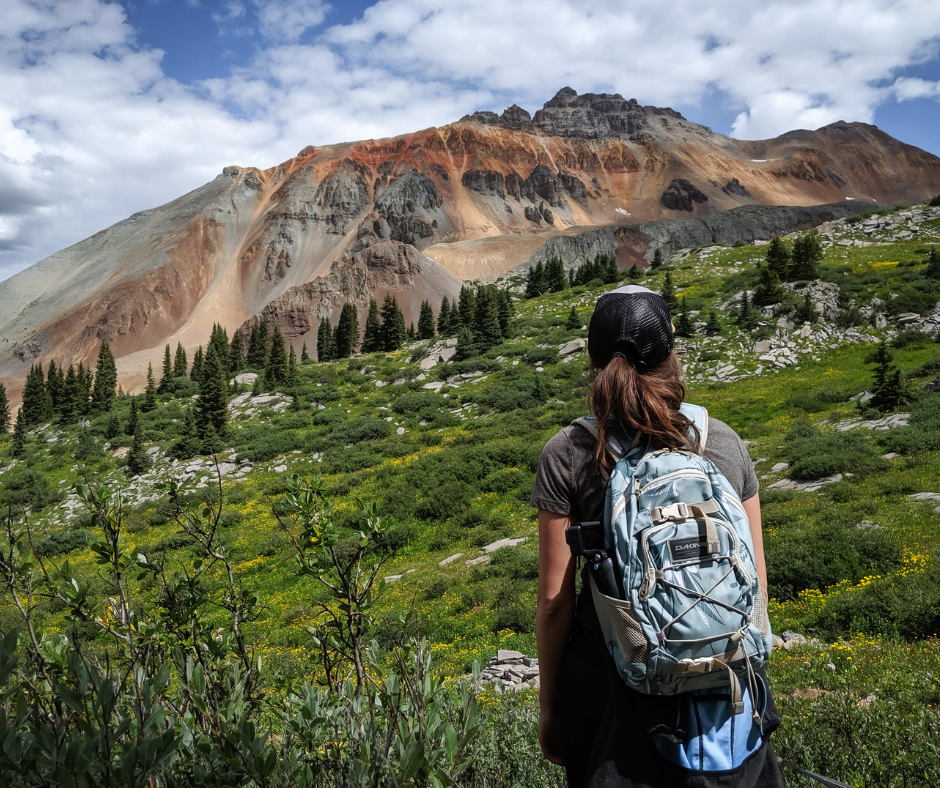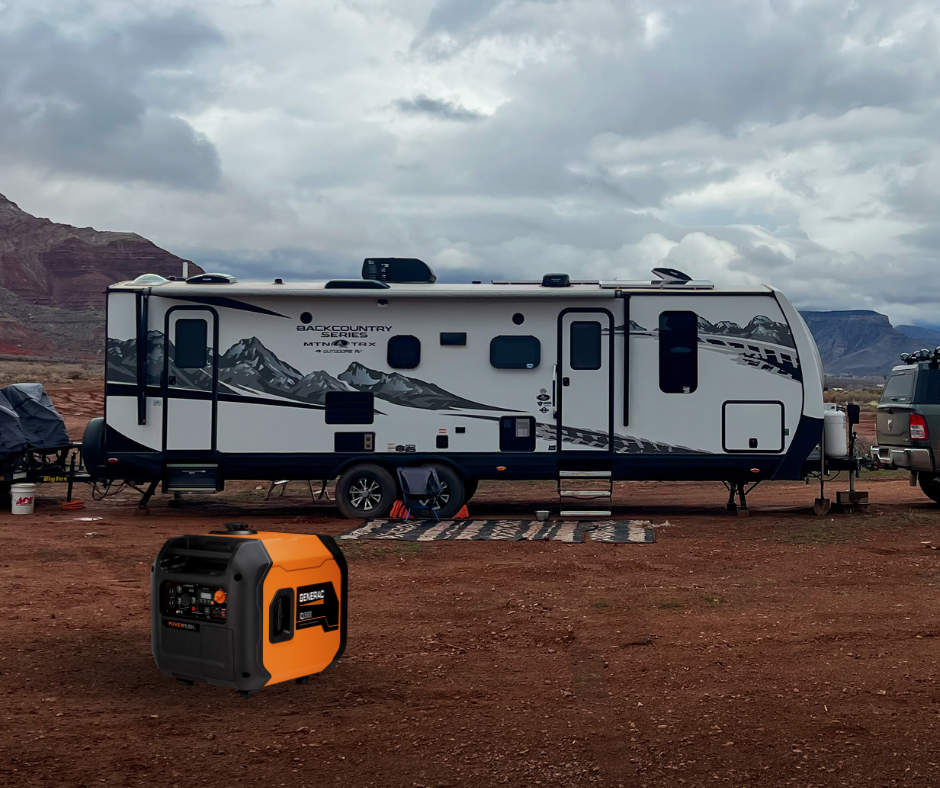No Bull$h!# Guide to Embarking upon Full-Time RV Living + Travel
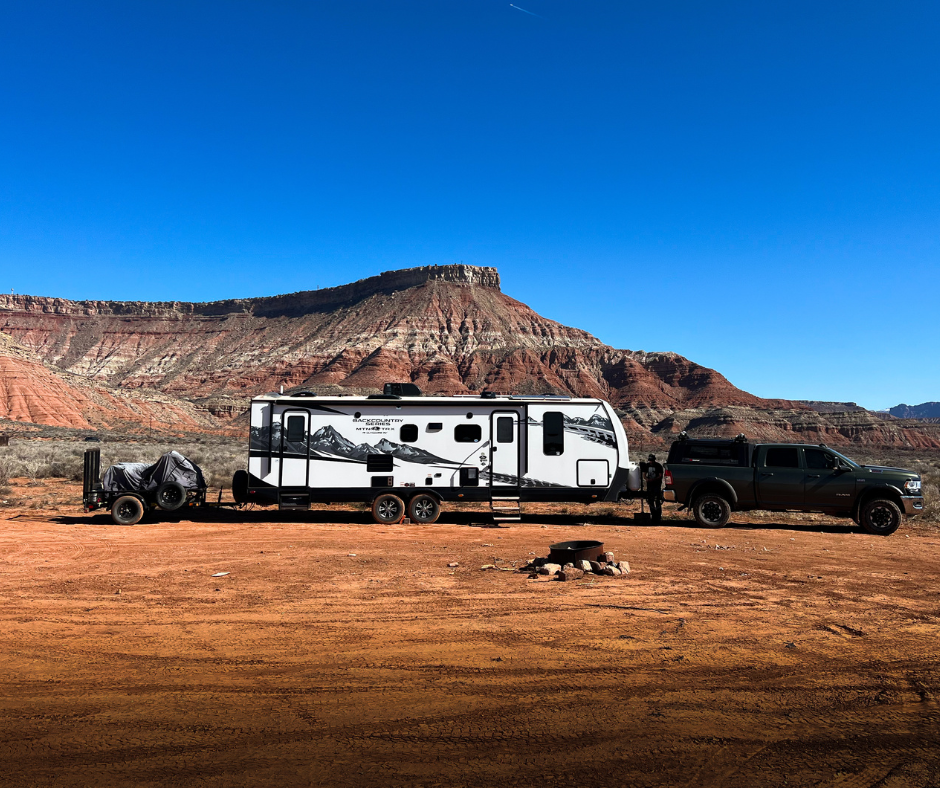
Table of Contents
ToggleFull-Time RV Living for Beginners
Living full-time in an RV may sound like a far-fetched dream, but for my husband and me, it has been a reality since 2019.
We were sick of the same old routine and decided to ditch our stationary lifestyle and hit the road with our furry companions—and it’s been one heck of a ride!
And let me tell you, the full-time RV life is no joke—it’s full of surprises, challenges, and unforgettable moments. But at the end of the day, we wouldn’t trade it for the world.
Throughout our journey, we have learned so much about this lifestyle, and now, we want to share our experience and knowledge with you!
In this comprehensive guide, we’ll walk you through everything you need to know about full-time RV living, from the benefits and challenges to the nuts and bolts of choosing and preparing for the journey ahead. So, buckle up, and let’s hit the road together.
What is Full-time RV Living?
Full-time RV living is a lifestyle choice that has gained popularity in recent years, as people seek more flexibility and freedom in their lives.
It involves living in an RV or camper full-time, traveling from place to place and experiencing new destinations on a regular basis.
For my husband and I, We wanted to break free from the monotony of everyday life and explore every nook and cranny of this beautiful country.
Trust me, there’s nothing like the freedom of being able to hit the open road whenever the mood strikes.
This lifestyle offered the perfect opportunity to explore the country and live life on our own terms. We were drawn to the idea of simplifying our lives and having the freedom to travel wherever we wanted, whenever we wanted.
We absolutely love it and now we want to help others figure out if this life is right for them!
Is Full-Time RV Living Right for You?
Before we hit the road, I had to do some serious preparation to make sure I was ready for this new way of life. Here’s some questions to ask yourself before you take the leap:
Do you understand the realities of full-time RV living?
First and foremost, I had to understand that full-time RV living is not a vacation. It’s a lifestyle that requires planning, flexibility, and a willingness to adapt to new situations.
From finding reliable sources of water and power to dealing with maintenance issues and unexpected weather conditions, there are many challenges to face when living on the road. But with the right mindset and a positive attitude, these challenges can become opportunities for growth and adventure.
Knowing your "why"
Before embarking on a full-time RV living journey, it’s important to understand your motivation behind it. Are you seeking adventure, freedom, or a simpler way of life?
Understanding your “why” will help guide your decisions and keep you motivated when the going gets tough.
For my husband and I, it was a combination of all three. We wanted to simplify our lives, travel the country, and experience new things every day.
Whatever your “why” may be, make sure it’s strong enough to carry you through the challenges that come with full-time RV living.
Setting expectations for full-time RV living
Finally, it’s important to set realistic expectations for your full-time RV living journey. Living on the road can be an incredible experience, but it’s not always easy or glamorous.
From navigating tight campsites to dealing with breakdowns and repairs, there will be times when things don’t go according to plan.
But with a positive attitude, a sense of humor, and a willingness to learn and grow, the rewards of full-time RV living far outweigh the challenges.
Understanding the different travel options for full-time RV living
For example, will you be exclusively boondocking, or will you be traveling from RV park to RV park using memberships like Harvest Hosts or Good Sam?
Understanding the advantages and disadvantages of each option can help you find a balance between cost, convenience, and experience. Let’s explore these options.
Option 1: Boondocking
Boondocking, also known as dry camping, is when you park your RV in a remote or undeveloped location without any hookups to water, electricity, or sewage.
We’ve boondocked in some of the most breathtaking locations, from the deserts of Arizona to the mountains of Colorado. But it’s important to understand the pros and cons of boondocking.
Advantages of boondocking include:
- Cost savings: Since there are no hookups, boondocking is free or low-cost compared to RV parks.
- Privacy: Boondocking locations are often secluded and offer more privacy than crowded RV parks.
- Natural setting: Boondocking allows you to experience nature in a more immersive way than staying in a parking lot-style RV park.
However, boondocking also has its challenges, including:
- Limited resources: Without hookups, you’ll need to manage your water, electricity, and waste carefully.
- Safety concerns: Boondocking in remote areas can pose safety risks, such as wildlife encounters or getting stuck in rough terrain.
- Comfort: Boondocking can be less comfortable than RV parks, especially for those who are used to more amenities.
When boondocking, it’s important to plan ahead for your water, electricity, and waste management needs. For water, you may need to bring extra jugs or invest in a portable water filtration system. For electricity, you can use a generator or solar panels to keep your batteries charged.
You’ll also need to know how full-time RVers find free camping.
Option 2: Traveling From RV Park to RV Park
There are many different types of RV parks available to full-time RVers. Private RV parks are owned and operated by companies or individuals, while state and national parks are managed by government entities.
Other types of RV parks include membership parks, which require a membership fee to access, and resort-style parks, which offer amenities like pools, spas, and golf courses.
While they can be a bit pricey, they offer some great perks like full hookups, laundry facilities, and often, a community of like-minded travelers. But not all RV parks are created equal, and some can feel more like a cramped parking lot than a serene campground.
Advantages of staying in RV parks include:
- Convenience: RV parks are often located near popular attractions and offer easy access to city amenities like grocery stores and restaurants.
- Amenities: RV parks may offer amenities like full hookups, laundry facilities, and WiFi.
- Safety: RV parks are often located in well-lit areas and offer security measures like gates and patrols.
However, there are also some disadvantages to staying in RV parks:
- Cost: RV parks can be more expensive than boondocking or other camping options, especially if you’re staying long-term.
- Crowds: RV parks can be crowded and noisy, especially during peak travel season.
- Rules: RV parks may have strict rules regarding pets, noise, and other issues.
For those looking to save money on RV park stays, popular membership programs can be a good option (more on this later).
Option 3: Combining Boondocking and RV Parks
Many full-time RVers choose to combine boondocking and RV parks to balance cost, convenience, and experience. This approach can provide a well-rounded and fulfilling RV lifestyle without getting burnt out.
Choosing the Right RV for Full-Time Living
Once you have figured out how you will be traveling, you can move on to choosing the right RV. This step is critical for anyone considering full-time RV living. With so many types and models available, it can be challenging to know where to start.
For us, starting out with a self-converted cargo trailer was a great way to test the waters and get a feel for what we needed in an RV. After two years, we upgraded to a 28 DBS Outdoors RV, which provided us with more space and amenities for our full-time living needs.
What RV is best for full-time living?
When it comes to buying an RV, there are many factors to consider. Will you be traveling solo or with a partner or family? What kind of activities do you plan on doing while on the road? How much storage space do you need?
Other considerations include size, layout, and features like slide-outs, outdoor kitchens, and entertainment systems, and how much you can afford to spend.
Will you be buying a used RV or financing your purchase?
The decision of whether to buy a used or new RV, and whether to finance or pay cash, depends on your individual financial situation and priorities. It’s important to carefully consider your options and make an informed decision that works best for you.
Here are some pros and cons to consider for each option:
New RVs
Pros:
- Warranty: A new RV typically comes with a manufacturer’s warranty, which can provide peace of mind and protection against unexpected repairs.
- Modern amenities: New RVs often come with the latest features and technology, such as energy-efficient appliances and four-season features for off-grid living.
Cons:
- Cost: A new RV can be significantly more expensive than a used one.
- Depreciation: Like cars, new RVs lose value quickly once they’re driven off the lot.
- Quality concerns: Some new RVs may have quality control issues, and it can take time for manufacturers to work out any kinks.
Used RVs
Pros:
- Cost: Used RVs can be significantly cheaper than new ones, making it easier to get a higher-quality RV for your budget.
- Value retention: Used RVs may hold their value better than new ones, particularly if they’re well-maintained.
- Immediate availability: With a used RV, you can often take it home right away without waiting for it to be built or delivered.
Cons:
- Maintenance: Used RVs may require more maintenance and repairs than new ones, particularly if they’re older.
If you’re considering living full-time in an RV, it’s important to carefully consider your options when it comes to buying or financing your purchase.
In fact, we have a blog post on our website that goes into more detail about choosing an RV to live in.
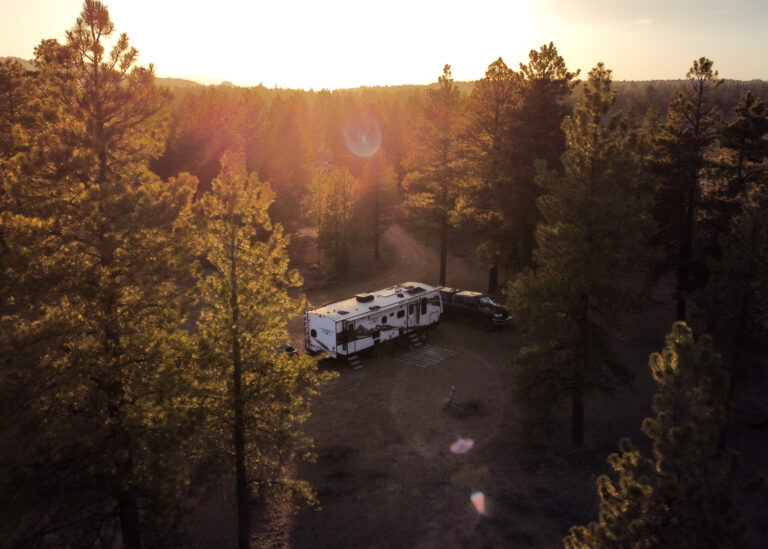
Preparing for Full-Time RV Living
Preparing for full-time RV living is an exciting but complex process that requires careful planning and preparation. Here are some essential steps to help you get started.
Downsizing and decluttering
The first step is downsizing and decluttering your possessions to fit into your RV’s limited space. This can be an emotional process, but many full-time RVers find that it’s also freeing to let go of excess stuff and focus on the essentials.
Start by separating your possessions into categories, and be prepared to make some tough choices about what to keep and what to sell or donate.
Choosing a Domicile State
Choosing a domicile state is another critical step in preparing for full-time RV living.
Many full-time RVers choose to establish South Dakota as their domicile state due to the state’s favorable tax and legal climate.
South Dakota has no state income tax and no vehicle inspections for private vehicles. In addition, the state has a relatively low vehicle registration fee, which can be significant cost savings for RVers who need to register their vehicle.
Getting Mail on the Road
As someone who has been living full-time in an RV for several years, I understand how important it is to have a reliable way of receiving mail and packages while on the road.
Learn more about the different mail and package delivery options available to RVers.
Understanding the Cost of Full-Time RV Living
One of the most significant factors to consider when transitioning to full-time RV living is the cost. While RV living can be a cost-effective alternative to traditional housing, it’s essential to understand the expenses associated with this lifestyle.
In addition, the cost of full-time RV living varies depending on a number of factors, such as location, RV size, and personal expenses. However, compared to the cost of traditional living, it can be quite affordable.
We’ve found that by being mindful of our spending, we can keep our costs low while still enjoying all the amazing experiences that full-time RV living has to offer.
Managing finances and budgeting
Full-time RV living requires careful financial planning and budgeting. You’ll need to consider expenses such as RV payments, fuel, maintenance, insurance, campground fees, and more. Create a detailed budget and track your expenses to ensure you stay within your means.
Finding Work and Income Opportunities While Full-Time RVing
Are you considering the full-time RV life and wondering how to make a little extra cash? There are plenty of ways to earn money while on the road. Here are some ideas to get you started:
- Campground Work: Many RV parks and campgrounds offer workamping opportunities, which allow you to exchange a few hours of work per week for a free campsite. You might help with cleaning, maintenance, or office tasks. This is a great way to save money on camping fees while getting to know the locals.
- Freelancing: If you have a skill that can be done remotely, such as writing, graphic design, or web development, you can offer your services as a freelancer. Websites like Upwork and Freelancer allow you to connect with clients from all over the world and set your own rates.
- Seasonal Jobs: Depending on where you’re traveling, there may be seasonal work available. For example, in the summer you could work as a camp counselor or lifeguard, while in the winter you could work at a ski resort. These jobs often come with perks like free lodging and discounted lift tickets.
- Pet Sitting or Dog Walking: Many pet owners are looking for someone to watch their furry friends while they’re away. You can advertise your services on websites like Rover or Care.com and make money while hanging out with cute animals.
- Amazon CamperForce: If you’re willing to work during the holiday season, Amazon CamperForce hires RVers to help with order fulfillment at their fulfillment centers. In addition to a paycheck, you’ll also receive a free campsite and utilities.
These are just a few of the many ways you can earn money while full-time RVing. Research different income opportunities and create a plan that works for your lifestyle and financial needs.
The key is to be flexible and willing to try new things. Who knows, you might just stumble upon your dream job while on the road!
Staying Connected on the Road
One of the many benefits of full-time RV living is the ability to travel and explore new places. However, staying connected can be a challenge, especially when it comes to internet and cell service.
For most full-time RVers, staying connected to the internet is crucial. Whether you work remotely, want to stay in touch with family and friends, or simply enjoy streaming your favorite shows, having reliable internet access is a top priority.
You’ll need to know how to find Wi-Fi hotspots, how to boost your signal with a cell phone booster, and what cell service provider is best for RV living. Many RVers invest in newer options like Starlink, a satellite internet service that has become increasingly popular among RVers due to its fast speeds and wide coverage area.
We discuss all of this and more in our post about how full-time RVers get internet.
Finding Places to Park Your RV
When it comes to finding places to park your RV, there are a few tricks that can help you score the best spots. And no, we’re not talking about bribing the campground host with homemade cookies (although we won’t judge if you try it!). We’re talking about RV memberships. If you plan to hop from RV park to RV park, it’s worth considering.
RV memberships for full-time RVers
If you really want to up your RV game, consider joining an RV club. These clubs are like secret societies for RVers, offering exclusive access to private campgrounds, member-only discounts, and even social events like happy hours and potlucks.
It’s a great way to connect with other RVers and get the inside scoop on the best activities around. Some great membership options include:
- Escapees RV Club: This is a popular membership program for full-time RVers that offers a range of benefits, including access to exclusive campgrounds, member-only events, and a mail-forwarding service.
- Thousand Trails: This membership program offers unlimited access to a network of campgrounds across the country, with no nightly fees or restrictions on the length of stay.
- Harvest Hosts: This unique membership program offers access to a network of wineries, farms, and other unique locations where RVers can park overnight for free in exchange for supporting local businesses.
- Passport America: This membership program offers discounts of up to 50% off nightly rates at participating campgrounds across the country.
- Good Sam Club: This membership program offers a range of benefits, including discounts on camping fees, fuel, and RV maintenance services.
- Boondockers Welcome: This membership program connects RVers with private property owners who are willing to let them park on their land for free or a nominal fee.
How to Find Boondocking Locations for Full-Time RVers
First and foremost, make use of RV-specific resources. There are tons of websites and apps out there designed specifically for RVers to find the perfect spot to park their rig. Not only can you search by location, but you can also filter by amenities, reviews, and more. Some of our favorites include:
- FreeCampsites.net: This website offers a comprehensive database of free campsites across the United States, with user reviews and photos to help you find the perfect spot.
- iOverlander: This app and website allows users to share information on free and low-cost camping locations, as well as other useful travel information like gas stations and dump stations.
- Campendium: This website and app offers user reviews and photos of campgrounds, RV parks, and boondocking locations across the country.
- AllStays: This app and website offers information on campgrounds, RV parks, and other lodging options, as well as free and low-cost camping locations.
- The Dyrt: This app and website offers user reviews and photos of campgrounds and RV parks, as well as information on free and low-cost camping options.
But don’t forget about government websites. Believe it or not, agencies like the Bureau of Land Management and National Park Service have all kinds of info on camping and boondocking locations on public lands. Plus, you can often find important details like fees, rules and regulations, and even some stunning photos to get you pumped for your next adventure.
Considerations for Traveling With Pets
When my husband and I decided to RV full time, we knew we couldn’t leave our beloved dogs and wolf dog behind. They are part of the family! But we also knew that traveling full-time with dogs would come with its own set of challenges.
Traveling with Pets in an RV Park or Campground
Not all RV parks and campgrounds are pet-friendly, and some may have strict rules about the size, breed, or number of pets allowed. Don’t leave things up to chance – do your research and make sure you’re booking a spot that welcomes your furry friends.
Fortunately, we quickly discovered that most RV parks are filled with people and pets alike. It’s a welcoming community that understands the joys and struggles of traveling with furry companions.
Of course, if you have what’s considered an “aggressive breed,” you may encounter more issues. We have a husky, and a pointer lab mix and although we have a wolf dog as well, we haven’t had any problems—but it’s always important to double-check if dogs are allowed and if there are any breed restrictions.
It’s also worth noting that some RV parks may charge an extra fee for having a pet. It’s not ideal, but it’s something to keep in mind when budgeting for your travels.
Traveling with Pets and Boondocking
Boondocking with dogs can be an amazing experience, but it’s important to keep a few things in mind to ensure you and your furry friend both have a pawsitively fantastic time.
First things first, plan ahead. Do your research and make sure you’re headed to a dog-friendly location. Bring all the essentials for your pet, including plenty of water and food, a water dish, a few toys, a sturdy leash, a collar with identification tags, and a first-aid kit.
When you’re boondocking, it’s important to keep your dog safe and secure. Keep them close to you at all times, especially at night. You might consider using a tie-out stake or portable dog fence to create a safe play area for your pup. And always follow Leave No Trace principles by packing out all trash and respecting the wildlife in the area.
Tips for Pet Safety While Full-Time RVing
Of course, we also wanted to make sure our dogs were safe and comfortable when we did leave them in the RV. We have a few things in place to help with that.
First, we installed a pet monitoring video camera so we can check in on them when we are away. We have Starlink so this is super easy. We also always leave a window open and, if it’s hot, the air conditioning is on. We also always turn the propane off. You can learn more of our tips and safety considerations for leaving your dogs alone in your RV.
Schooling for Full-Time Traveling With Kids
One of the most important things to consider when traveling with kids what method of homeschooling, e-schooling, or radical “unschooling” you want to pursue.
One of the best things about homeschooling is that you have the freedom to tailor your child’s education to their interests and learning style. Plus, you can incorporate real-life experiences into their education by visiting historical sites, museums, and national parks. Additionally, local libraries and historical sites can offer hands-on learning opportunities that can’t be replicated in a traditional classroom.
But before you make any decisions, it’s important to talk to your family and figure out what works best for everyone. Who will be in charge of teaching? Do you want to spend all day at the kitchen table with your kiddos?
And hey, it’s totally okay to change your mind later on. Especially if you’re a full-time RVer, homeschooling takes on a whole new meaning. Traveling can be unpredictable and chaotic, but that doesn’t mean you can’t make it work. Just keep in mind that your schooling style may need to adapt to your on-the-go lifestyle.
There are many online resources available to help with homeschooling or unschooling your children while on the road. One great resource is Khan Academy, which offers free online courses in math, science, history, and more. You can also check out Outschool, which offers online classes in a variety of subjects taught by certified teachers. You can check out this full-time families resources for Unschooling.
Building Community on the Road
Living on the road can be a thrilling adventure, but it can also be a lonely experience. When you’re constantly on the move, it can be hard to establish meaningful connections with others. However, building community on the road is not only possible, but it can also enhance your traveling experience. Here are some tips for connecting with others while living the nomadic life:
- Attend Meetups and Events: Many RVers organize meetups and events, which are a great way to connect with like-minded individuals. Whether it’s a potluck dinner, a hiking excursion, or a game night, attending these events can help you make new friends and create lasting memories.
- Volunteer: Volunteering is a fantastic way to give back to the communities you visit while also meeting new people. Whether you volunteer at a local animal shelter or help out with a community garden, you’ll be able to connect with others who share your passion for making a positive impact.
- Join Online Communities: Social media platforms like Facebook and Instagram offer plenty of opportunities to connect with other RVers. Join groups or follow hashtags related to RVing and travel, and participate in discussions. This is a great way to exchange tips, advice, and experiences with others.
- Host a Happy Hour: If you’re staying at an RV park or campground, consider organizing a happy hour with your neighbors. You can provide snacks and drinks, and invite others to come socialize. This is a great way to break the ice and get to know your fellow travelers.
- Offer a Helping Hand: Sometimes, the best way to connect with others is by simply being helpful. If you see someone struggling to set up their RV, offer to lend a hand. If someone needs a ride into town, offer to take them. These small acts of kindness can go a long way in building meaningful connections.
Tips for Planning and Navigating Routes for Full-Time RV Travel
Planning and navigating routes for full-time RV travel can be both exhilarating and daunting. But don’t worry, we’ve got you covered with some fun and practical tips to help set you up for success:
Research, Research, Research
Before you hit the road, do your homework! Research potential routes, campsites, and attractions along the way. There are many online resources that can help, such as RV park review websites, travel blogs, and social media groups for RVers.
Consider the Weather
Depending on the time of year and the location you’re traveling to, the weather can play a big role in your trip. Plan accordingly by checking the forecast and adjusting your route or schedule as needed. Don’t forget to pack for different weather conditions too!
Take Your Time
Don’t rush through your travels! Take the time to enjoy the journey and explore the areas you’re passing through. You’ll likely discover hidden gems and unexpected adventures along the way.
Be Flexible
Sometimes unexpected things happen, and you may need to change your plans on the fly. Be prepared to adjust your route or schedule as needed, and don’t stress too much about minor setbacks.
Invest in a National Parks Pass
With a National Parks Pass, you’ll gain access to over 2,000 federal recreation sites across the country. This includes all national parks, wildlife refuges, and other federal lands. The cost of individual entry fees to these sites can add up quickly, but with a pass, you’ll only pay one flat fee for the entire year!
Understanding The Good and the Bad of Full-Time RV Living
Ah, the full-time RV lifestyle—it’s a dream come true for some, but not everyone is cut out for the open road. So let’s take a moment to break down the pros and cons of this lifestyle:
Benefits of Full-Time RV Living
Let’s start with the good news, shall we? Full-time RV living offers a range of benefits that make it a truly rewarding lifestyle. Here’s a few of the benefits we’ve experienced by living this way:
Flexibility and freedom
First and foremost, it provides the ultimate flexibility and freedom to explore the world on your own terms. With no fixed schedule or obligations to tie you down, you’re free to chart your own course and see where the road takes you. And, unlike traditional travel, you can linger in the places you love and move on from those that don’t speak to you. Whether you want to park your RV on the beach, in the mountains, or in the middle of the desert, the choice is yours.
Cost savings
Another significant benefit of full-time RV living is the cost savings it provides. By eliminating mortgage or rent payments, you can save a significant amount of money each month. Moreover, you’ll have the ability to control your expenses more effectively and make choices that align with your budget.
Ability to travel and explore new places
Living in an RV allows you to explore new places and experience the beauty of nature in ways that are simply not possible with other forms of travel. Whether you prefer stunning mountain vistas or serene coastal views, RV living can take you there. Moreover, it provides the opportunity to engage in outdoor activities such as hiking, kayaking, and fishing, and truly connect with the natural world.
Minimalism and simplification
Minimalism and simplification are also significant benefits of full-time RV living. Living in a smaller space means you’ll need to adopt a simpler and more minimalist lifestyle, which can be both liberating and empowering. By reducing your possessions and focusing on the essentials, you’ll gain a greater sense of clarity and purpose in your life. In addition, you’ll learn to value experiences over possessions, and cultivate a sense of gratitude and contentment that is truly priceless.
Challenges of Full-Time RV Living
While full-time RV living is undoubtedly an adventurous and rewarding lifestyle, let’s be real here—full-time RV travel isn’t always sunshine and rainbows.
Adapting to a smaller living space
One of the most significant adjustments you’ll need to make is adapting to a smaller living space. While RVs come in a range of sizes and layouts, it’s essential to prepare yourself for the realities of living in a more compact environment. However, many full-time RVers find that downsizing is a liberating experience that allows them to live more intentionally and focus on the things that truly matter.
Navigating unfamiliar locations and RV parks
Another challenge of full-time RV living is navigating unfamiliar locations and RV parks. From choosing the right campground to finding the best driving routes, there’s a learning curve to be overcome. But with a little patience and perseverance, you’ll quickly discover the best practices and tools to help you navigate the challenges of the road.
Towing a Long Rig
One of the biggest challenges we’ve faced is having such a long rig. Since we almost exclusively boondock, finding spots to park our RV can be a bit of a headache. Did I mention we also triple-tow? AKA, the art of hauling not one, but TWO trailers behind your tow vehicle—we’re a train! At 65 feet long, our setup is longer than the average blue whale! And don’t even think about trying to back up.
Maintaining relationships with family and friends
Maintaining relationships with family and friends can also be challenging for full-time RVers. However, modern technology makes it easier than ever to stay connected, whether through video calls, social media, or online forums. Moreover, full-time RV living provides many opportunities to meet new people and form meaningful connections with fellow travelers.
Adjusting to a constantly changing routine
Adjusting to a constantly changing routine is another challenge that full-time RVers must face. However, many find that the ability to mix things up and embrace new experiences is one of the most rewarding aspects of RV living. With the freedom to set your own schedule and explore at your leisure, you’ll quickly discover the joys of life on the open road.
The difficulties of maintaining a marriage on the road
Living full-time in an RV with your spouse can be an incredible adventure, but it does come with its challenges. One of the biggest challenges my partner and I faced was learning how to maintain a healthy and happy marriage while living in a small space on the road.
Living in close quarters has allowed us to really focus on our relationship and work through any disagreements that come up in a timely manner. It has also forced us to get creative with our communication and to find new and exciting ways to spend quality time together. While it’s not always easy, maintaining a strong marriage on the road is possible with a little effort and a lot of love.
Unpredictable Weather
Extreme heat or cold can be uncomfortable, and inclement weather can impact travel plans. You’ll need to be prepared for both ends of the temperature spectrum by making sure your RV us equipped with a quality heating and cooling system. On hot days, you’ll be grateful for the ability to crank up the AC and stay cool, while during chilly nights you’ll want to cozy up with a warm blanket and some hot cocoa.
But even more than heat and cold, it’s inclement weather that can really throw a wrench into your plans. Rain, wind, snow, and hail can all impact your travel plans and make for a less-than-ideal living situation. You’ll need to stay on top of weather forecasts and be prepared to hunker down if needed.
Full-Time RV Living Must Haves
Are you ready to hit the open road and live that full-time RV life? It’s tempting to just hop in your rig and go, but hold your horses. You don’t want to forget these essential must-haves for your journey.
Whether you’re parking it in an RV park or boondocking off the grid, your needs will be different. So here are a few of the most essential things you’ll want to bring along:
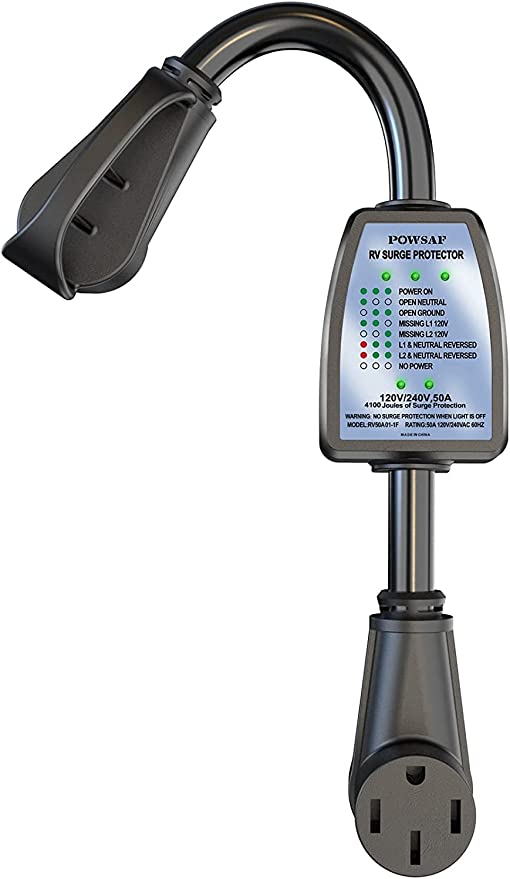
RV Surge Protector: Keep your rig and all your electronics safe from power surges and spikes at RV parks with a good surge protector. Trust us, it’s worth the investment!

Leveling Blocks: You don’t want to be sleeping on a hill, do you? Make sure to bring some leveling blocks to even out your rig on any terrain.
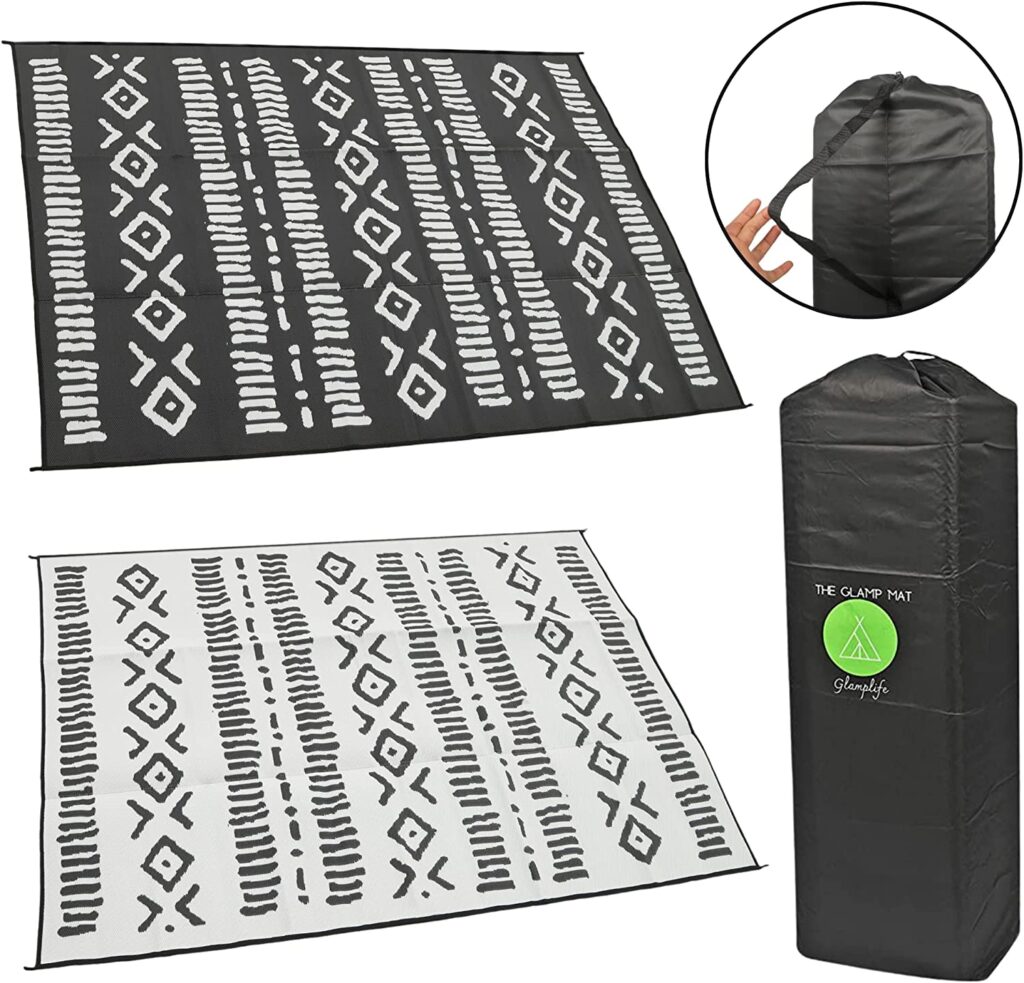
Outdoor Mat: Whether you’re lounging under the awning or cooking up some grub outside, an outdoor mat is a game changer. It’ll keep your shoes and your rig clean and add some homey vibes to your campsite.
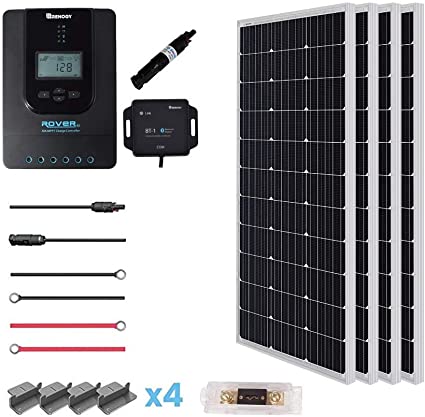
Solar Panels: If you’re planning on boondocking, solar panels are the way to go. They’ll keep your batteries charged and your lights on without the need for a hookup.

Generator: For those times when the sun just ain’t shining, a generator can be a lifesaver. It’ll keep your batteries charged, your fridge cold, and your devices powered up.
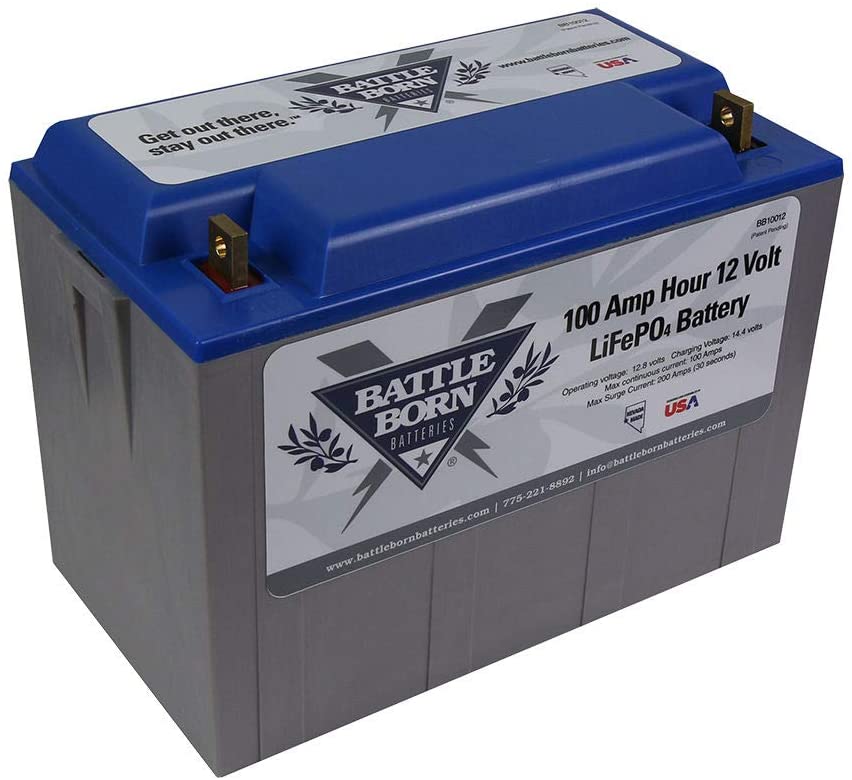
Lithium Batteries: Upgrade your batteries to lithium-ion for longer life and faster charging times.
You can check out our complete list of RV upgrades for full-time living and your experience will be more comfortable, convenient, and enjoyable than ever before.
Full-Time RV Living Final Thoughts
Full-time RV living can offer a unique and rewarding lifestyle for those seeking adventure, flexibility, and connection with the outdoors. While there are certainly challenges, such as adapting to a smaller living space and navigating unfamiliar locations, the benefits of full-time RV living—including cost savings, travel opportunities, and connection with nature—can far outweigh the difficulties.
For those considering this lifestyle, it’s important to do your research, plan ahead, and stay organized. Additionally, it’s important to stay flexible and adaptable, as the RV lifestyle is constantly changing and evolving. With the right mindset and preparation, full-time RV living can be a fulfilling and enriching experience.
Resources for further reading and research:
- The Cost of Full-Time RV Living: Tips for Managing Your Finances
- How to Boondock: The Complete Guide
- How Full-Time RVers find Free Camping
- How Full-Time RVers Get Internet on the Road
- How to Choose an RV for Full-Time Living
- Best 4 Season RVs For Full-Time Living
- How Full-Time RVers Get Mail and Packages While Traveling



